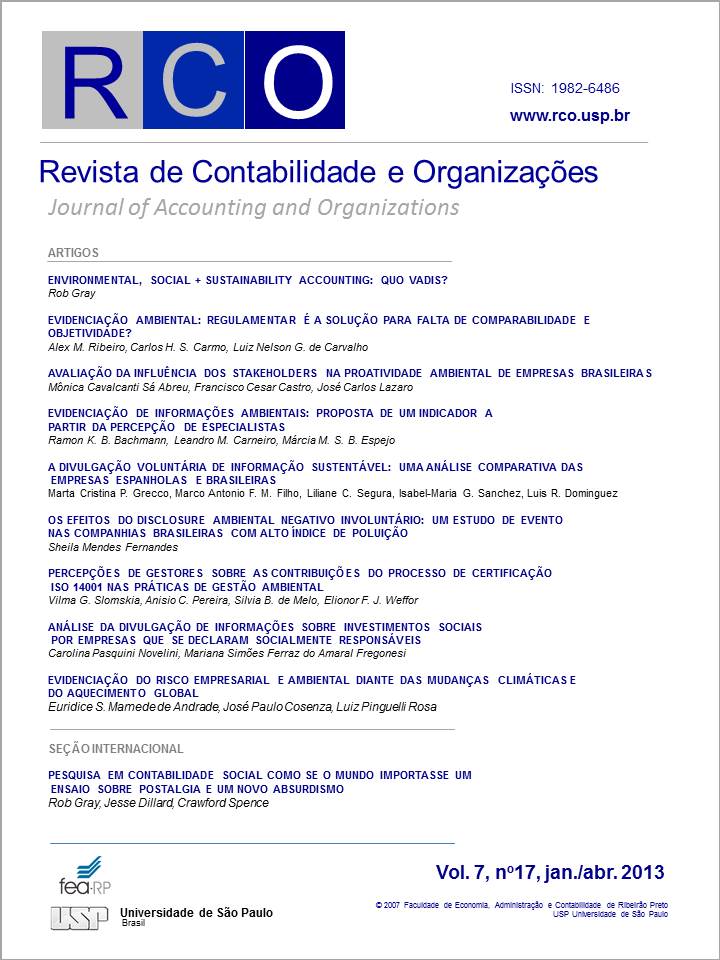THE EFFECTS OF INVOLUNTARY NEGATIVE ENVIROMENTAL DISCLUSURE: AN EVENT STUDY IN BRAZILIAN COMPANIES WITH A HIGH PULLUTION INDEX
DOI:
https://doi.org/10.11606/rco.v7i17.56668Keywords:
environmental disclosure, event study, efficient market hypothesis, Brazilian companies.Abstract
The aim in this study was to identify the influence of involuntary negative environmental disclosure on abnormal returns in sectors with high pollution indices: Exploitation, Refining, Metallic Minerals, Paper and Pulp and Iron and Steel. To achieve the proposed objective, the event study method was used, based on the Efficient Market Hypothesis. The sample selected totals 29 events, referent to the period from 2007 till 2012. T statistics of different variances was used, as well as the Wilcoxon test for paired variables, with a view to detecting whether the volatility of stock prices before the event is statistically different from stock prices after the event. The results demonstrated that the disclosure of environmental events negatively affected stock prices and returns, evidencing the semi-strong form of the Brazilian stock market, that is, the stock price reflects publicly available information in a rapid and precise manner. Also, the negative reaction of investors was observed until the third day after the event for the iron and steel and paper and pulp sectors, and until the fourth day after the event for the metallic minerals and exploitation and refining sectors, after which the stock prices and returns went back to normal levels.mumente utilizadas (tamanho, rentabilidade etc.) nos modelos de análise do nível de endividamento, contribuiu para o entendimento da estrutura de capital de empresas brasileiras.Downloads
Downloads
Published
Issue
Section
License
The RCO adopts the Free Open Access policy, under the standard Creative Commons agreement (CC BY-NC-ND 4.0). The agreement provides that:
- Submission of text authorizes its publication and implies commitment that the same material is not being submitted to another journal. The original is considered definitive.
- Authors retain the copyright and grant the journal the right of first publication, with the work simultaneously licensed under the Creative Commons Attribution License which allows the sharing of the work with acknowledgment of authorship and initial publication in this journal.
- Authors are authorized to take additional contracts separately, for non-exclusive distribution of the version of the work published in this journal (e.g. publish in an institutional repository or as a book chapter), with necessary recognition of authorship and initial publication in this journal.
- Authors are allowed and encouraged to publish and distribute their work online (e.g. in institutional repositories or on their personal page) before or during the editorial process, as this can generate productive changes as well as increase the impact and citation of published work (See The Effect of Free Access).
- The journal does not pay copyright to the authors of the published texts.
- The journal's copyright holder, except those already agreed in the Free Open Access Agreement (CC BY-NC-ND 4.0), is the Accounting Department of the Faculty of Economics, Administration and Accounting of Ribeirão Preto of the University of São Paulo.
No submission or publication fees are charged.
Up to 4 authors per article are accepted. Exceptionally duly justified cases may be reviewed by the Executive Committee of the RCO. Exceptional cases are considered as: multi-institutional projects; manuscripts resulting from the collaboration of research groups; or involving large teams for evidence collection, construction of primary data, and comparative experiments.
It is recommended that the authorship be ordered by contribution of each of the individuals listed as authors, especially in the design and planning of the research project, in obtaining or analyzing and interpreting data, and writing. Authors must declare the actual contributions of each author, filling the letter to the editor, at the beginning of the submission, taking responsibility for the information given.
Authors are allowed to change throughout the evaluation process and prior to the publication of the manuscript. The Authors should indicate the composition and final order of authorship in the document signed by all those involved when accepted for publication. If the composition and authoring order is different than previously reported in the system, all previously listed authors should be in agreement.
In the case of identification of authorship without merit or contribution (ghost, guest or gift authorship), the RCO follows the procedure recommended by COPE.








